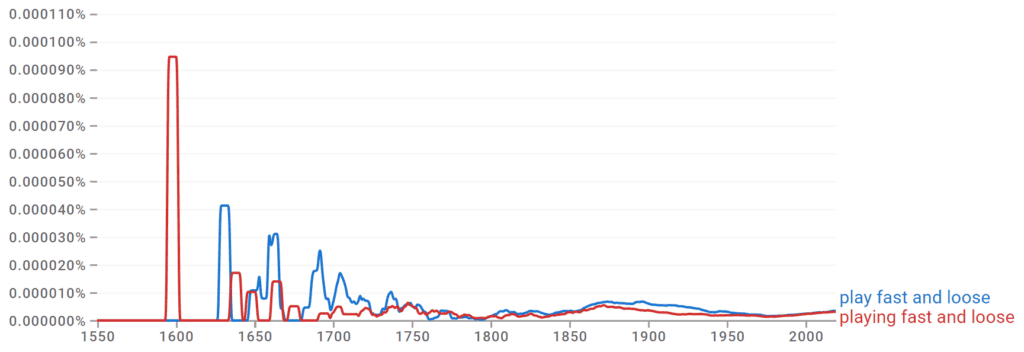To play fast and loose means to lack regard for rules or to behave recklessly and immorally. For example, I recently urged a friend to resign from her job due to how fast and loose the company played with her contract. The expression has been in use since the 16th century as a way to highlight carelessness.
An idiom, like play fast and loose, is a figurative expression used to enhance and elaborate on a point, often offering connections to metaphors, allusions, allegories, and symbols for deeper comprehension. Idioms are commonly employed in informal speech, and understanding their meanings can enhance your mastery of English grammar.
Keep reading to understand the full meaning behind the idiom playing fast and loose, its origins, and how to use it in various examples.
Play Fast and Loose Meaning

To play fast and loose means to behave recklessly, unreliably, or immorally.
When someone uses this phrase, they indicate that an individual’s actions show little respect for rules, ethics, or boundaries. This term often points to hasty decisions without considering consequences.
Playing Fast and Loose Synonyms
- Taking liberties
- Being reckless
- Acting irresponsibly
- Behaving carelessly
- Engaging in deceit
- Disregarding boundaries
- Taking undue risks
Using Playing Fast and Loose in a Sentence
- He played fast and loose with the company’s finances, leading to significant losses.
- Jane disliked how the politician played fast and loose with the facts during the debate.
- Playing fast and loose with safety regulations can lead to severe consequences.
- Their team was playing fast and loose with the project deadlines, causing frustration among stakeholders.
- It’s essential not to play fast and loose when making critical health decisions.
- Playing fast and loose with the truth can erode trust quickly.
- The contractor was playing fast and loose with building codes, which raised concerns.
Play Fast and Loose Origin

The phrase play fast and loose came into use as early as the mid-1500s to mean both the method of cheating in a carnival game and as an idiom to mean to behave in a careless manner.
To play fast and loose was originally the name of a type of carnival game in which the player attempts to snare a hoop or leather loop with a stick. The idea is to use the stick to make the loop fast or secure. However, the game operator cheats the customer by rigging it so that the loop remains loose.
By the latter half of the 1500s, this phrase was used metaphorically to describe careless or deceitful behavior. Some early mentions include:
George Whetstone’s The right excellent historye of Promos and Cassandra in 1578:
At fast or loose, with my Giptian, I meane to haue a cast.
It is also seen in Tottel’s Miscellany in 1557:
Of a new maried studient that plaied fast or loose.
And again in Shakespeare’s King John in 1595:
…So newly join’d in love, so strong in both,
Unyoke this seizure and this kind regreet?
Play fast and loose with faith? so jest with heaven,
Let’s Review
The idiom playing fast and loose describes individuals or situations characterized by a lack of honesty, integrity, or responsible behavior. It highlights a tendency to manipulate or disregard rules, boundaries, or ethical considerations for personal gain or advantage.
The term first came into use in the 16th century to describe a rigged carnival game. Keeping a loop “loose” allowed the person in control to cheat, thus the reason why the expression became synonymous with a person’s lack of integrity.
Check out some others we covered:
